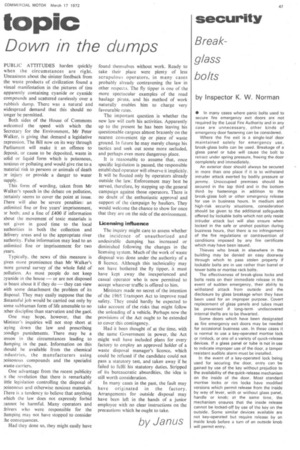topic Down in the dumps
Page 49

If you've noticed an error in this article please click here to report it so we can fix it.
PUBLIC ATTITUDES harden quickly when the circumstances are right. Uneasiness about the sinister feedback from the waste products of civilization found a visual manifestation in the pictures of tins apparently containing cyanide or cyanide compounds and scattered carelessly over a rubbish dump. There was a natural and widespread demand that this should no longer be permitted.
Both sides of the House of Commons welcomed the speed with which the Secretary for the Environment, Mr Peter Walker, is giving that demand a legislative mpression. The Bill now on its way through Parliament will make it an offence to deposit, or cause to be deposited, waste in solid or liquid form which is poisonous, noxious or polluting and would give rise to a material risk to persons or animals of death ar injury or provide a danger to water supply.
This form of wording, taken from Mr Walker's speech in the debate on pollution, :ertainly seems to cover the point at issue. There will also be severe penalties: an unlimited fine or five years' imprisonment, pr both; and a fine of £400 if information about the movement of toxic materials is not given in good time to the local authorities in both the collection and delivery areas and to the appropriate river authority. False information may lead to an unlimited fine or imprisonment for two years.
Typically, the news of this measure is given more prominence than Mr Walker's more general survey of the whole field of pollution. As most people do not keep :yanide in the house — or are not disposed no boast about it if they do — they can view with some detachment the problem of its disposal. They may easily suppose that the distasteful job would be carried out only by some subhuman form of life amenable to no ather discipline than starvation and the gaol.
One may hope, however, that the Minister's inquiries will not stop short at laying down the law and prescribing :ondign punishments. There may be a lesson in the circumstances leading to dumping in the past. Information on this should be available from the chemical industries, the manufacturers using poisonous compounds and the specialist waste carriers.
One advantage from the recent publicity is the revelation that there is remarkably little legislation controlling the disposal of poisonous and otherwise noxious materials. There is a tendency to believe that anything which the law does not expressly forbid :annot be harmful. Many operators and drivers who were responsible for the dumping may not have stopped to consider :he consequences.
Had they done so, they might easily have found themselves without work. Ready to take their place were plenty of less scrupulous operators, in many cases probably already contravening the law in other respects. The fly tipper is one of the more spectacular examples of the road haulage pirate, and his method of work naturally enables him to charge very favourable rates.
The important question is whether the new law will curb his activities. Apparently up to the present he has been leaving his questionable cargoes almost brazenly on the nearest convenient tip or piece of waste ground. In future he may merely change his tactics and seek out some more secluded, and perhaps even more dangerous place.
It is reasonable to assume that, once specific legislation is passed, the responsible established operator will observe it implicitly. It will be flouted only by operators already outside the law.' Enforcement may best be served, therefore, by stepping up the general campaign against those operators. There is no doubt of the enthusiastic approval and support of the Campaign by hauliers. They would welcome the chance to show for once that they are on the side of the environment.
Licensing influence The inquiry might care to assess whether the incidence of unauthorized and undesirable dumping has increased or diminished following the changes in the licensing system. Much of the work of waste disposal was done under the authority of a B licence. Although this technicality may not have bothered the fly tipper, it must have kept away the inexperienced and casual operator who is now permitted to accept whatever traffic is offered to him.
Ministers made no secret of the intention of the 196?, Transport Act to improve road safety. They could hardly be expected to take account of the risks that might follow the unloading of a vehicle. Perhaps now the provisions of the Act ought to be extended to cover this contingency.
Had it been thought of at the time, with the same Government in power, the Act might well have included plans for every factory to employ an approved holder of a waste disposal manager's licence, which could be refused if the candidate could not pass a statutory test, and taken away if he failed to fulfil his statutory duties. Stripped of its bureaucratic absurdities, the idea is still worth consideration.
In many cases in the past, the fault may have originated in the factory. Arrangements for outside disposal may have been left in the hands of a junior employee with no clear instructions on the precautions which he ought to take.
by Janus










































































































